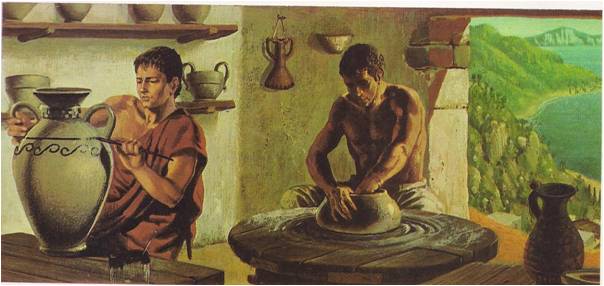In 343 B. C., the philosopher Aristotle left the quiet of his study and journeyed to Macedonia, a country in the mountain wilderness north of Greece. He had been hired to tutor the rowdy young son of a king. The boy, Alexander, was a yellow-haired thirteen-year-old. His manners were polite and he seemed to be clever enough, but he was wild. It was hard for him to pay attention to his studies. He much preferred galloping across the fields on his huge horse. He proudly told his new tutor that he had tamed the horse himself. When he did come …
Read More »Tag Archives: Greece
Greece Fights for its Life 499 B. C.-479 B. C.
Across the Aegean, from the oriental court of King Darius of Persia, came messengers to all the city-states of mainland Greece. Their words were smooth, their smiles like sneers and they demanded gifts for their master – earth and water, the ancient tokens of tribute and surrender. The Greeks in Asia Minor already knew the Persians – too well; once the smiling messengers had come to the cities. After the messengers, the soldiers came, attacking the little poleis, one by one, until all of them were taken. Nothing could stop the Persian armies. From the capital, deep in Asia, they …
Read More »Sparta: City of Soldiers B. C. 700 – 500
In Sparta, the shops in the market place had little gold or jewelry to sell and no fine furniture at all. The people in the streets were not well dressed. Even the temples, although big, were plain and there was little in Sparta to show that this was the strongest polis in Greece. Sparta was old fashioned and proud of it. The polis had begun as a kingdom and it stayed a kingdom. The only change its citizens made in more than 400 years was to have two kings instead of one. Each kept a watchful eye on the other …
Read More »Athens: City of Wisdom and War 700 B. C. to 500 B. C.
Of all the city-states in Greece, Athens was the most fortunate. The city’s guardian was Athena, the goddess of war and wisdom. Indeed, the Athenians did well in war and were blessed with wisdom. In the dark days, when barbaric invaders had conquered one city after another, Athens had not surrendered. Later, when Athens felt the growing pains that brought civil war and ruin to so many city-states, a series of wise men guided Athenians safely through their troubles. The right leaders always seemed to come along at the right time. It was more than good luck, ofcourse. The Athenians …
Read More »Kings, Tyrants and Democracy 1000 B. C. to 100 B. C.
During the Dark Ages, the large kingdoms of Homer’s Achaean heroes had disappeared. The Greek world was now dotted with dozens of little countries. They had begun with fortresses set on hills and crags. Soon each fortress was surrounded by a village, as farmers abandoned their huts in the fields and built new homes close to the walls. In times of danger, they could take refuge behind the walls. A market place was built and a few metalsmiths and potters opened shops. When temples were set up inside the fortress, the castle hill became an acropolis, a “high town,” the …
Read More »The Silent Peninsula 3000 B.C. to 1600 B.C.
About 3000 B. C., when the Pharaohs ruled Egypt and Babylon was the home of mighty kings, bands of sailors set out from Asia Minor. They followed a little chain of islands that led northward across the unexplored sea that, centuries later, would be called the Mediterranean. If the islands had not been there, the sailors would never have dared to sail so far from home. Asia, the only world they knew, stopped at the eastern store of the sea. Some of the men were afraid that they might suddenly reach the end of the world and drop over it …
Read More »




